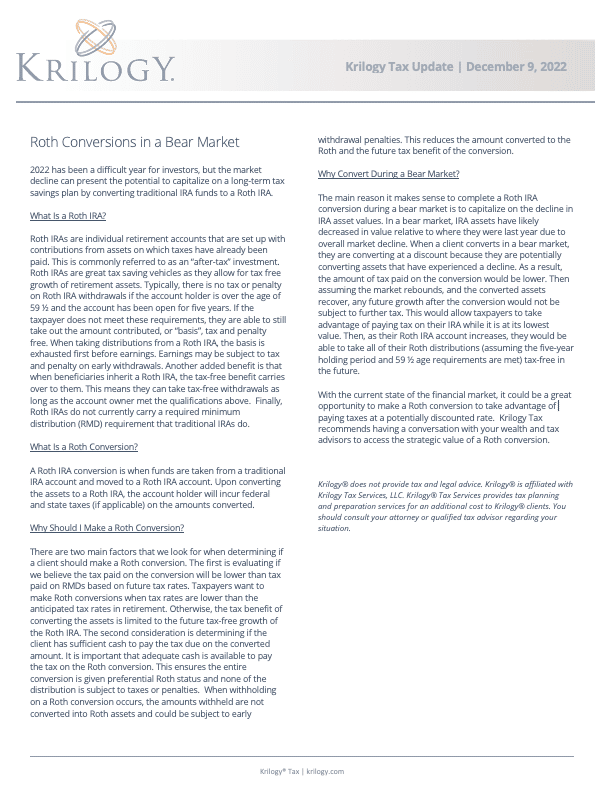Roth Conversions in a Bear Market
2022 has been a difficult year for investors, but the market decline can present the potential to capitalize on a long-term tax savings plan by converting traditional IRA funds to a Roth IRA.
What Is a Roth IRA?
Roth IRAs are individual retirement accounts that are set up with contributions from assets on which taxes have already been paid. This is commonly referred to as an “after-tax” investment. Roth IRAs are great tax saving vehicles as they allow for tax free growth of retirement assets. Typically, there is no tax or penalty on Roth IRA withdrawals if the account holder is over the age of 59 ½ and the account has been open for five years. If the taxpayer does not meet these requirements, they are able to still take out the amount contributed, or “basis”, tax and penalty free. When taking distributions from a Roth IRA, the basis is exhausted first before earnings. Earnings may be subject to tax and penalty on early withdrawals. Another added benefit is that when beneficiaries inherit a Roth IRA, the tax-free benefit carries over to them. This means they can take tax-free withdrawals as long as the account owner met the qualifications above. Finally, Roth IRAs do not currently carry a required minimum distribution (RMD) requirement that traditional IRAs do.
What Is a Roth Conversion?
A Roth IRA conversion is when funds are taken from a traditional IRA account and moved to a Roth IRA account. Upon converting the assets to a Roth IRA, the account holder will incur federal and state taxes (if applicable) on the amounts converted.
Why Should I Make a Roth Conversion?
There are two main factors that we look for when determining if a client should make a Roth conversion. The first is evaluating if we believe the tax paid on the conversion will be lower than tax paid on RMDs based on future tax rates. Taxpayers want to make Roth conversions when tax rates are lower than the anticipated tax rates in retirement. Otherwise, the tax benefit of converting the assets is limited to the future tax-free growth of the Roth IRA. The second consideration is determining if the client has sufficient cash to pay the tax due on the converted amount. It is important that adequate cash is available to pay the tax on the Roth conversion. This ensures the entire conversion is given preferential Roth status and none of the distribution is subject to taxes or penalties. When withholding on a Roth conversion occurs, the amounts withheld are not converted into Roth assets and could be subject to early withdrawal penalties. This reduces the amount converted to the Roth and the future tax benefit of the conversion.
Why Convert During a Bear Market?
The main reason it makes sense to complete a Roth IRA conversion during a bear market is to capitalize on the decline in IRA asset values. In a bear market, IRA assets have likely decreased in value relative to where they were last year due to overall market decline. When a client converts in a bear market, they are converting at a discount because they are potentially converting assets that have experienced a decline. As a result, the amount of tax paid on the conversion would be lower. Then assuming the market rebounds, and the converted assets recover, any future growth after the conversion would not be subject to further tax. This would allow taxpayers to take advantage of paying tax on their IRA while it is at its lowest value. Then, as their Roth IRA account increases, they would be able to take all of their Roth distributions (assuming the five-year holding period and 59 ½ age requirements are met) tax-free in the future.
With the current state of the financial market, it could be a great opportunity to make a Roth conversion to take advantage of paying taxes at a potentially discounted rate. Krilogy Tax recommends having a conversation with your wealth and tax advisors to access the strategic value of a Roth conversion.
Krilogy® does not provide tax and legal advice. Krilogy® is affiliated with Krilogy Tax Services, LLC. Krilogy® Tax Services provides tax planning and preparation services for an additional cost to Krilogy® clients. You should consult your attorney or qualified tax advisor regarding your situation.














